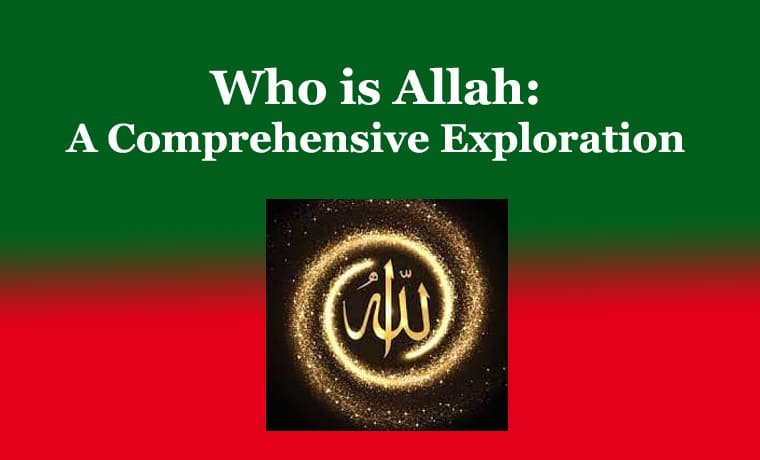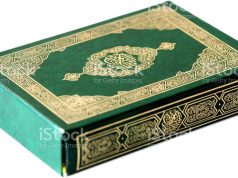“Explore in this article: Who is Allah’ the concept of Allah in Islam with insights from the Quran. Understand His attributes of mercy, justice, and omnipresence in this comprehensive guide. keep reading the article, ‘Who is Allah: A Comprehensive Exploration’.
Who is Allah: A Comprehensive Exploration
Introduction
To explre, Who is Allah” let’s begin with Allah in Islam. The concept of ‘Allah’ is central to faith, theology, and practice in Islam. Allah is the Arabic word for God, denoting the ultimate, omnipresent divine presence. The term “Allah” is not limited to Islam, but is used to refer to God across Arabic-speaking communities of various religions. For Muslims, Allah is the only deity, the creator of the heavens and earth, and the sustainer of all existence. The Quran, Islam’s holy text, frequently refers to Allah, providing a complex understanding of His attributes, essence, and relationship with creation.
This article discusses in depth the meaning of Allah in Islam, referencing Quranic verses to explain His divine attributes. In addition, it highlights the similarities between the concept of Allah and how God is referred to in other religious traditions.
Allah in Islam: The Only True God
In Islamic theology, Allah is ‘ahad’ (one and unique). Surah al-Ikhlas, a chapter revered for its essence of monotheism, states:
- Say: He is Allah, the One and Only;
- Allah, the Eternal, Absolute;
- He begetteth not, nor is He begotten;
- And there is none like unto Him.
This passage emphasizes the uniqueness of Allah, separating Him from any anthropomorphic or polytheistic concepts. He is eternal, with no beginning or end, and cannot be compared to anything in creation. This essence underlies the Islamic creed of ‘Tawhid’ (the Oneness of God), which is fundamental to a Muslim’s belief system.
Names and Attributes of Allah
The Quran refers to Allah through His ‘Asma’ul Husna’ (Most Beautiful Names), which are a set of 99 attributes that describe His perfection, majesty, and mercy. Some of these names are as follows:
1. Ar-Rahman (The Most Merciful)
“In the name of Allah, the Most Gracious, the Most Merciful.”(Quran 1:1)
Allah’s mercy encompasses all creation. The Quran consistently emphasizes His mercy as a defining characteristic, assuring both believers and non-believers of His infinite compassion.
You May Like:
10 Sentences About the Holy Quran
2. Al-Khaliq (The Creator)
“He is Allah, the Creator, the Inventor, the Maker; to Him belong the best names.” (Quran 59:24)
This verse underscores Allah’s role as the creator of the universe. His creativity is unmatched, and every element of existence points to His divine artistry.
3. Al-Adl (The Just)
“Indeed, Allah does not do injustice, [even] as much as the weight of an atom.” (Quran 4:40)
Allah’s justice is absolute and fair. Every action is measured, and the final decision is in His hand.
4. As-Sami’ (The All-Hearing) and Al-Basir (The All-Seeing)
“Indeed, my Lord is the Hearer of prayer.” (Quran 14:39)
“And He is the Hearer, the Seeker.” (Quran 42:11)
These attributes reflect Allah’s acute awareness of all human actions and thoughts, reinforcing His omnipresence and omniscience.
The Role of Allah in Human Life
The Quran often portrays Allah as humanity’s nurturer and guide. Surah Al-Baqarah declares:
“Allah is the ally of those who believe. He brings them out of darkness into light.” (Quran 2:257)
This verse highlights Allah’s active role in guiding believers from ignorance and sin to knowledge and righteousness. Through revelation, prophets, and personal connection through prayer (dua), Allah provides guidance and consolation.
Another essential verse of the Quran shows Allah’s closeness to His creation:
“And We have already created man and know what his soul says to him, and We are closer to him than even [his] jugular vein.”(Quran 50:16)
This close relationship assures believers that Allah is constantly aware of their struggles, intentions, and actions.
Allah and the Universal Creator
Although “Allah” is primarily associated with Islam, the term shares conceptual similarities with God in other religions. For example:
Christianity: In Arabic-speaking Christian communities, the term “Allah” is used to denote God in the Bible. This reflects a shared monotheistic basis.
Judaism: The Hebrew word “Elohim”, meaning “God”, bears linguistic similarities to “Allah”. Both terms denote the same creator.
Hinduism: The concept of ‘Brahman’, the ultimate, formless reality, reflects some of the characteristics of Allah, such as eternity and incomprehensibility.
These similarities highlight the universal quest to understand God, linking faiths in the search for the infinite.
Allah’s Mercy and Forgiveness
A recurring theme in the Quran is Allah’s forgiveness. Surah Az-Zumar assures:
“Say, ‘O My servants who wrong themselves [by sinning], do not despair of Allah’s mercy. Surely, Allah forgives all sins.'” (Quran 39:53)
No matter how far a person goes astray, the Quran assures believers that sincere repentance opens the door to Allah’s forgiveness. This reflects His infinite mercy and compassion.
Allah as the Supreme Judge
While Allah is merciful, the Quran also emphasizes His role as the final judge:
“And We set the scales of justice for the Day of Resurrection, so that no soul will be wronged.” (Quran 21:47)
On the Day of Judgement, each soul will be held accountable for its deeds. Allah’s judgment is impartial and devoid of human bias.
Allah in Other Religions: Synonyms and Similarities
Yahweh (Judaism): Refers to the God of Abraham, who is similar to Allah in monotheistic traditions.
Theos (Christianity): The Greek word for God, which aligns with the omnipotence and omniscience given to Allah.
Ishwar (Hinduism): Symbolizes the supreme ruler, which resonates with the sovereignty of Allah.
Ahura Mazda (Zoroastrianism): Wise God, similar to Allah as creator and sustainer.
Such words underscore humanity’s shared effort to express the concept of God.
Conclusion
Allah in Islam embodies divine perfection, including mercy, justice, and omnipotence. The Quran’s vivid descriptions and frequent references to Allah provide Muslims with a framework for understanding and connecting with their Creator. While unique in its theological depth, the concept of Allah resonates with the divine attributes recognized in the major world religions.
The universality of Allah’s attributes – his mercy, justice, and omnipresence – reminds humanity of their shared spiritual heritage. By considering Allah through the lens of the Quran and other traditions, one can appreciate the unity underlying diverse understandings of God.
Who is Allah: FAQs
1. Who is Allah in Islam?
Allah is the Arabic term for God and is the central figure in Islamic faith. He is the One, eternal Creator and Sustainer of the universe, as described in the Quran. Muslims worship Allah as the sole deity, embodying ultimate mercy, justice, and omnipotence.
2. What does the word “Allah” mean?
The word “Allah” comes from Arabic, combining “Al” (The) and “Ilah” (God), meaning “The God.” It signifies the one true God worshipped by Muslims and is also used by Arabic-speaking Christians and Jews to refer to God.
3. How many names does Allah have?
Allah has 99 names, known as Asma’ul Husna, or “The Most Beautiful Names.” Each name reflects a unique attribute of Allah, such as Ar-Rahman (The Most Merciful), Al-Khaliq (The Creator), and Al-Adl (The Just).
4. What is the difference between Allah and God?
“Allah” is the Arabic word for “God.” In essence, Allah and God refer to the same Supreme Being in monotheistic traditions. However, the term “Allah” is specific to Islamic theology, emphasizing His oneness (Tawheed) and unique attributes.
5. Does Allah have a gender?
Allah is beyond human characteristics, including gender. While the Quran uses masculine pronouns for linguistic reasons, Allah is considered transcendent and incomparable to any creation.
6. How is Allah described in the Quran?
The Quran describes Allah as the All-Knowing, All-Merciful, Just, Omnipotent, and the Creator of everything. Key verses like Surah Al-Ikhlas (112:1-4) and Ayat-ul-Kursi (2:255) highlight His attributes and role as the ultimate Sustainer.
7. Is “Allah” used in other religions?
Yes, Arabic-speaking Christians and Jews also use “Allah” to refer to God. The term is not exclusive to Islam and predates its emergence as a universal term for the monotheistic deity.
8. Why is Allah called the Most Merciful?
Allah’s mercy is emphasized throughout the Quran. He is Ar-Rahman (The Most Merciful) and Ar-Raheem (The Especially Merciful), offering forgiveness and guidance to humanity, regardless of their sins, when they repent sincerely.
9. What is the role of Allah in human life?
In Islam, Allah is the Sustainer, Guide, and Judge. He provides humans with purpose, guidance through the Quran, and accountability on the Day of Judgment. Believers seek His help and blessings in every aspect of life.
10. How do Muslims worship Allah?
Muslims worship Allah through prayer (Salah), fasting, charity, pilgrimage (Hajj), and following His guidance as revealed in the Quran and exemplified by Prophet Muhammad (peace be upon him).
11. Can Allah forgive all sins?
Yes, Allah forgives all sins for those who sincerely repent. The Quran states, “Do not despair of the mercy of Allah. Indeed, Allah forgives all sins” (Quran 39:53).
12. Is Allah the same as the God of Christianity and Judaism?
Muslims believe Allah is the same God worshipped by Christians and Jews, as all three religions trace their roots to Abraham. However, theological differences exist regarding His nature and attributes.
13. Why is Allah described as omnipotent and omniscient?
Allah is described as omnipotent (All-Powerful) and omniscient (All-Knowing) because He created and sustains the universe, is aware of everything, and controls all events, past, present, and future.
14. How can I learn more about Allah?
To learn more about Allah, you can study the Quran, Islamic theology, and Hadith literature. Engaging with knowledgeable scholars and exploring resources on Islamic faith can also deepen understanding.
15. Who is Allah according to the Quran?
According to the Quran, Allah is the only God, eternal and incomparable. He is described as almighty, omniscient, and most merciful.
16. Who is Allah and what does he do?
Allah is the supreme being who created and sustained the universe. He provides guidance, shows mercy, and holds everyone accountable for their actions on the Day of Judgment.
17. Who is Allah in other religions?
In Arabic-speaking Christian and Jewish communities, “Allah” is also used to refer to God, signifying the same supreme being worshiped in monotheistic traditions.
18. Who is Allah, and why is He worshiped?
Allah is worshiped because He is the creator of all existence, the most merciful, and the final judge. Worshiping Allah is central to the Islamic faith and reflects submission to His divine will.
N.B. If you find the article, ‘Who is Allah” please share your feelings and thoughts with us. We appreciate feedback of any kind with thanks.







